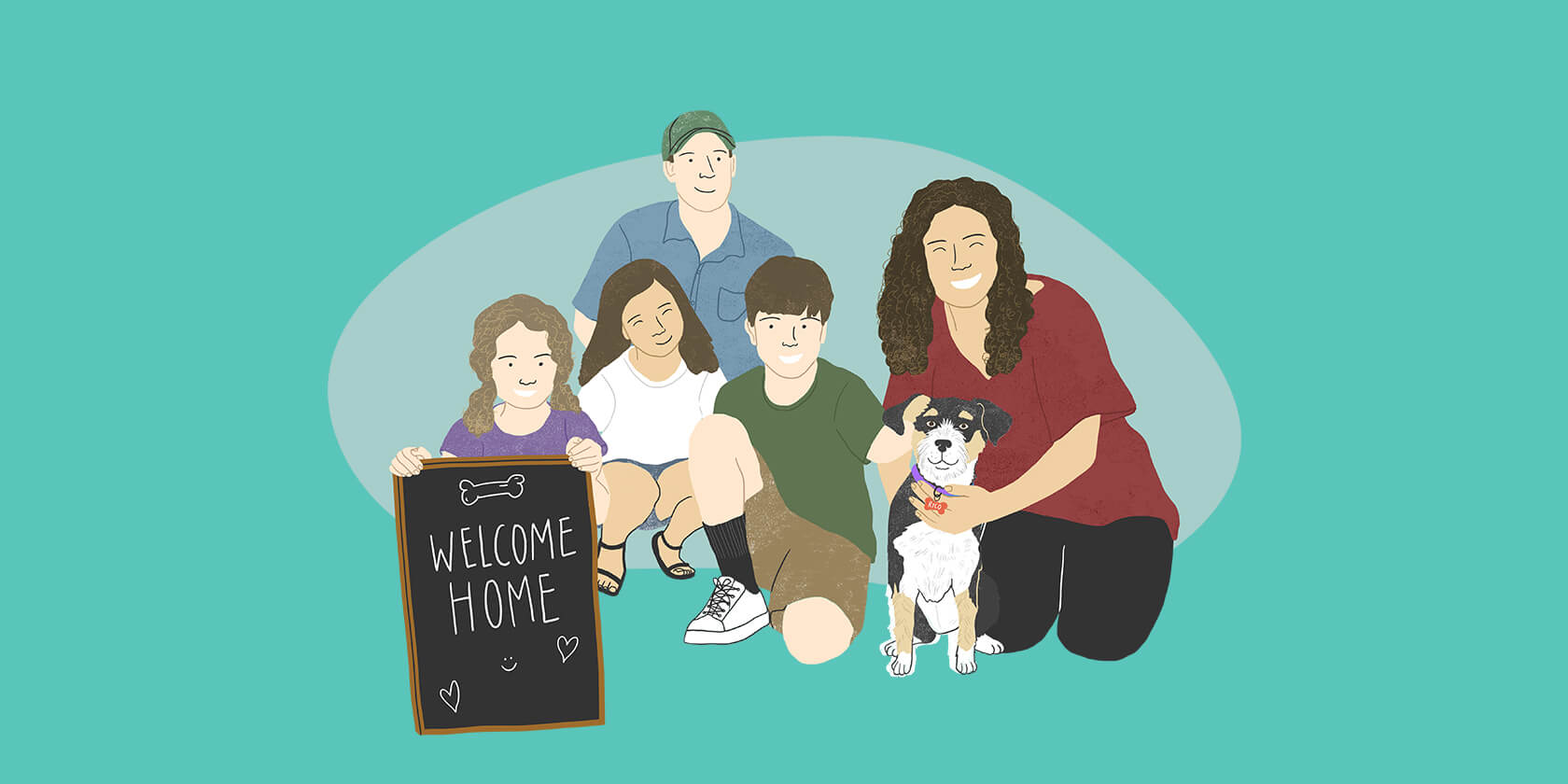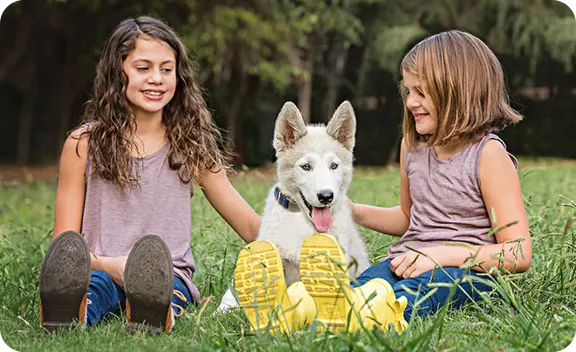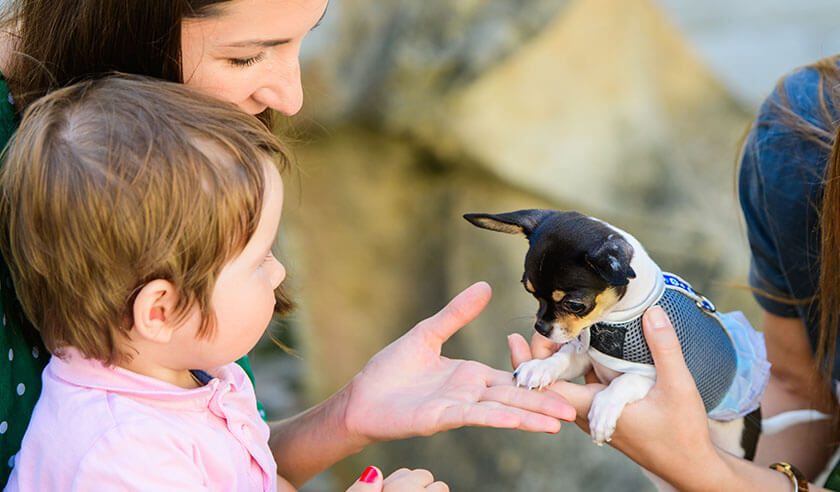Growing up with a dog is a wonderful experience for many children. If you're getting ready to add a dog to your family, you might be wondering what breed will do best with your kids. The short answer? Most breeds can make great dogs for families with kids — but finding the right pup for your household takes planning, open-mindedness, and commitment.
You might be drawn to a particular breed or breed mix for a number of reasons including their typical temperament and care requirements, and whether they tend to be well–suited for a household with children. But a dog's breed isn't everything. Every dog is an individual, no matter their breed. Many other factors help determine what dog is best for your family. Once you narrow your search, it is important to consider a particular dog’s history and socialization, plus your child’s (or children's) age, personality, and activity level.
While there are plenty of options for pure breed dogs, consider adopting a dog from a shelter or rescue organization. There are many pups in need of a loving home and chances are you can find one that is your ideal breed or breed mix!

What Can You Learn from a Dog's Breed?
A dog's breed or breed mix can tell you a great deal about the kind of care they'll need. For example, when it comes to grooming, a breed's coat type is a good indicator for how much brushing they'll need, their potential for shedding, and whether they'll need frequent bathing or professional grooming. A breed's "purpose" (like herding or retrieving), energy level, and even size may influence the amount of exercise they'll need. Larger sporting breeds, like a Labrador Retriever, will typically require more daily exercise than smaller toy breeds, like a Maltese.
A dog's breed can also give you an idea of what typical temperaments you can expect. Dogs bred for cooperative work with humans, such as hunting and retrieving, often tend to be very sociable and outgoing. Some breeds originally bred for companionship tend to be more of a "one–person" dog, while others love anyone they meet. Dogs bred to work more independently, like for herding or guarding livestock, might seem more aloof with strangers.
Lastly, breed can tell you what tendencies your dog might have. Certain breed groups tend to be high–energy, more vocal, and love to chase moving things. Other breeds tend to be more introverted with unknown people, protective, or territorial.
What Breed Qualities are Important if You Have Children at Home?
When looking for a breed of dog that will fit best with your children, consider the following:
Size
Size isn't everything when it comes to dogs and kids, but it can affect the way they interact with each other. In a home with very active or young children, for example, small and medium breeds work well with children who are learning how to interact with a dog. A larger, sturdier breed can also do well in a home with active and playful children. Regardless of your dog's size, make sure to manage exuberant play and excitement — for the sake of both your child and your dog!
Sociability
If you have a large family or your children enjoy having friends over often, consider a breed that loves interacting with different people. And if you tend to have doggie guests along with their people, choose a dog that gets along well with other pups.
Grooming
If your kids have allergies, it's important to consider fur type. Less allergenic dog fur, like that of Poodles, often requires more grooming appointments and at-home brushing to prevent matting. Although, it is important to note, that no breed is truly hypoallergenic. Double-coated dog breeds, such as Australian Shepherds, Labs, and Collies, need very frequent brushing (and you'll want to invest in a quality vacuum).
Training
All dogs, regardless of their breed, should be given some level of training (like sit, stay, off, take) using positive reinforcement. Dogs bred to work more independently might need advanced training that requires a commitment from their owner. Dogs bred for companionship are often eager to please and a breeze to train (with the right treats, of course!).
Activity and Exercise
Dogs of all sizes and energy levels need consistent exercise, but some need more than others. High–energy breeds like Border Collies will need lots of physical exercise and can often benefit from having a "job" like playing fetch. Other breeds are content with their daily walks and relaxing on the couch. It's important to discuss with your veterinarian how much and what type of exercise your particular dog needs.
What About Mixed Breed Dogs?
If you're considering adopting a mixed breed dog or "mutt," how will you know if they'll do well with children? In some cases, you might be able to find out about their history like whether they've lived with children or other dogs before. In other cases, an adoptable dog's history might not be known. This is why having meet-and-greets before adoption is super important, regardless of how much you know about your potential new best friend. Pay careful attention to a dog's body language, their interactions with adults, and their reaction to your children. Are they loose, bouncy, and happy when they see your kids? Or do they get scared, tense, or seem hesitant or uncomfortable when close to children? Depending on the environment of your meetup even a normally happy, calm pup can appear stressed out — but it is important to trust your instincts about whether he or she is a good fit for your family.
Since different dog breeds have different instinctual drives, look at the breeds that are part of your potential pup's mix. Mixed breeds can often have the "best of both worlds" of individual breeds, but they also inherit the requirements for care and exercise requirements. Knowing what behavioral traits a mixed breed dog might have inherited from their parent breeds can give you some insight into their needs and how they'd do in a household with children.
A dog's breed is just one factor to consider when finding a family dog. Nearly every breed or breed mix can make an excellent pet for families with children as long as they are properly socialized, cared for, and have their instinctual needs met. Most importantly, it's crucial to teach children how to interact with a dog appropriately and always supervise interactions between young children and dogs as both species can be unpredictable at times. Involving your children in training and caring for your pup will strengthen their bond and provide valuable lessons in responsibility. Raising a dog in a household with children can bring happiness and love to the whole family.
ZPC-00987R1





